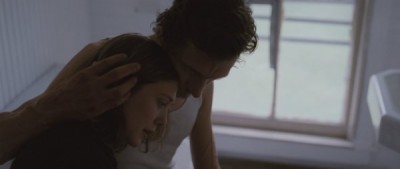| Reviews & Columns |
|
Reviews DVD TV on DVD Blu-ray 4K UHD International DVDs In Theaters Reviews by Studio Video Games Features Collector Series DVDs Easter Egg Database Interviews DVD Talk Radio Feature Articles Columns Anime Talk DVD Savant Horror DVDs The M.O.D. Squad Art House HD Talk Silent DVD
|
DVD Talk Forum |
|
|
| Resources |
|
DVD Price Search Customer Service #'s RCE Info Links |
|
Columns
|
|
|
Martha Marcy May Marlene

Reviewed at the 2011 New York Film Festival
The group lives communally, on a farmhouse up in the Catskills. By day they work; everyone has their job, their place. At night, the men eat first, in silence, while the women sit tensely in the next room and wait for them to finish. Once the men are done, the women take their places at the table. They sleep several members to the room; the only one who gets a room of his own is Patrick (John Hawkes), the leader, though he insists, with false modesty, that the home belongs to all of them. And then early one morning, before anyone is awake, Martha (Elizabeth Olsen) runs away.
What happens to her next, as she attempts to understand her time with the group and why it has made her the way she is, is the basis of Martha Marcy May Marlene, an extraordinary new film from writer/director Sean Durkin. Her story unfolds over two interlocking timelines: the two years she spent in the Catskills, in what first seems a commune and, it slowly becomes clear, was actually a cult; and the two weeks immediately following her escape, as she recuperates in the Connecticut lake house of her estranged sister Lucy (Sarah Paulson) and her brother-in-law Ted (Hugh Dancy). Lucy presses her for an explanation of where she's been and what happened to her. Martha doesn't want to talk. But memories and images begin to surface.
Durkin is in no hurry to get to his exposition--indeed, he seems intent on holding out key information for as long as possible, letting the details reveal themselves slowly and effectively. We see at first why Martha, who has a troubled family history, is drawn to this loose group of smiling people, and why she is particularly vulnerable to Patrick's Psych 101 insights. Durkin's script is admirable in its insistence on showing rather than telling; he gives us a sense of how a group like this works, how Patrick gets his hold and maintains it, how the others perpetuate the order of things, often using the same words and phrases that they heard when they joined. Meanwhile, the scenes of Martha's integration into a normal household (relatively speaking) are equally fraught--she's lost her sense of boundaries, of what is appropriate, and her type-A sister doesn't help by admonishing her with a warning like "That's not normal!" This poor girl no longer has the vaguest sense of what's normal.
The filmmaker uses elegant transitions, knockout photography, and a truly masterful command of sound to navigate between Martha's two stories, and infuses both with a mood of dread--one that is frequently conveyed in heavy, terrifying silences. (The ambient score, by Daniel Bensi and Saunder Jurriaans, is used sparingly, but to great effect.) The picture gets us all knotted up and uncomfortable, particularly since it takes a while to fully grasp the dark places that it's going to go.
The narrative's enigmatic nature owes much to the terrific performance of Hawkes. It is hard to watch his work here and not think of Charles Manson (especially when he picks up his guitar), but this disciplined actor steadfastly refuses to overplay. He never raises his voice; his terror is purely psychological.
But the takeaway performance, the one that's been drawing nonstop attention since the picture's Sundance premiere all the way back in January (it also played Cannes and Toronto on its way to New York), is that of star Olsen, and every word of buzz she has received is earned. She is the younger sister of the Olsen twins, but bears less a resemblance to them than to a younger Vera Farmiga; she also has that actor's same quiet intensity. In both halves of the narrative, and in different ways, it is very much a reactive performance, but she's never just listening in a scene--the camera regards the complexity of her silent emotions as Hawkes plays a song to her, or as her sister and brother-in-law argue about her, and picks up on every tiny, messy thing she does. It's not a big, showy performance; she doesn't get the kind of arias that, say, Keira Knightely gets in A Dangerous Method. But she nails every single note.
There's a queasy inevitability to the events of Martha Marcy May Marlene--we see things coming, in both timeframes, but never in clumsy or obvious ways. The progression of the storytelling is all of a piece with the film's naturalistic style. So is the rather ambiguous ending, which seemed to befuddle much of the audience I saw it with. But it seemed absolutely correct, particularly considering that the story's real ending (emotionally, at least) came a few minutes earlier, with a particularly bruising argument between Martha and her sister that culminated in this simple exchange:
Lucy: What happened to you?
Martha: I don't know.
And she doesn't, and she can't. And there you go.
Jason lives in New York. He holds an MA in Cultural Reporting and Criticism from NYU.
|
| Popular Reviews |
| Sponsored Links |
|
|
| Sponsored Links |
|
|
| Release List | Reviews | Shop | Newsletter | Forum | DVD Giveaways | Blu-Ray | Advertise |
|
Copyright 2024 DVDTalk.com All Rights Reserved. Legal Info, Privacy Policy, Terms of Use,
Manage Preferences,
Your Privacy Choices | |||||||










